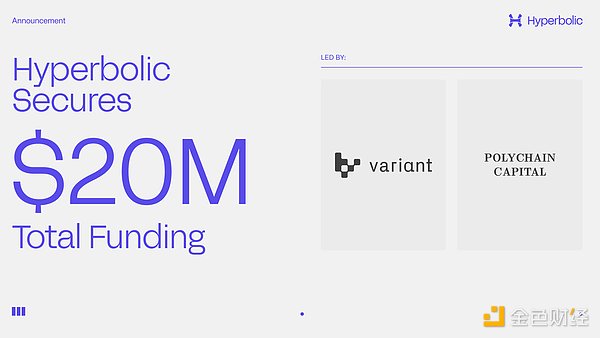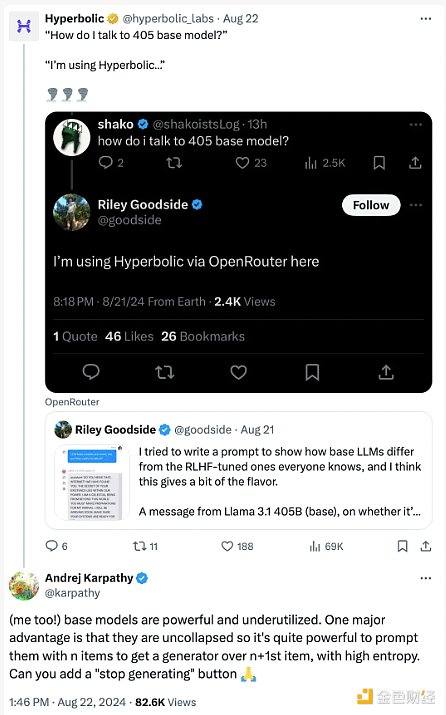Compiled by: Jinse Finance
Note: On December 10, 2024, the Crypto x AI project Hyperbolic announced the completion of a $12 million Series A funding round, led by Variant and Polychain Capital. Adding to Hyperbolic's previous $7 million seed round led by Polychain Capital and Lightspeed Faction, as well as earlier pre-seed funding, Hyperbolic has now raised a total of $20 million.

For more information on the Hyperbolic project, please refer to the previous Jinse Finance report "Understanding the Crypto x AI Rising Star Hyperbolic".
At the same time, Variant published an article on its official website explaining why it led the investment in Hyperbolic. Let's follow Variant and take a look at Variant's investment logic for Hyperbolic.
The transformation of computing platforms often evolves in pairs or groups, usually accompanied by new hardware, applications, and distribution innovations that drive each other forward. For example: personal computers, the internet, and the World Wide Web. Mobile devices, social networks, and cloud computing.
We believe that a powerful new combination is emerging at the intersection of crypto (technology) and AI. AI requires large-scale coordinated GPUs, while crypto leverages incentive mechanisms to aggregate resources. AI is probabilistic, while crypto is deterministic. We believe crypto can solve two of AI's most pressing problems: cost and trust (especially trust cost).
Cost and Trust
Let's explain in more detail:
Cost
The current cost of running models is extremely high. The root cause is often attributed to a supply problem, with the largest tech companies hoarding GPUs leading to shortages. But this is not the case; there are plenty of GPUs in data centers, mining farms, personal computers, and local machines around the world. Instead, the apparent scarcity of GPUs is due to their decentralized supply and lack of coordination. So the real challenge we face is the coordination problem in the decentralized network of GPU suppliers, which makes them expensive.
Trust
The decentralized network of GPUs has lower raw costs, but it introduces a new problem: the cost of trust. How do you trust that the models running on a network composed of different participants are running correctly? The traditional crypto solution is to have each node execute the same computations, introducing a lot of overhead, or to completely reduce the computational burden.
But this doesn't work for AI models, as having each node execute the same computations is too slow, and reducing the model size also reduces quality. Undoubtedly, there are also verification issues in centralized environments (e.g., how do you know if ChatGPT is giving you GPT-4 or GPT-3.5?), but OpenAI's reputation can more cheaply support trust, albeit lacking the rigor of crypto. When asking for a cookie recipe, this verifiability may not matter, but when asking if a medical image contains a malignant tumor, it certainly does. As AI takes on increasingly important roles in society, the cost of trust will only increase. Crypto networks are ahead of the curve here, as they must solve the verification problem to reduce costs.
This is where Hyperbolic comes in.
What is Hyperbolic
Hyperbolic is the first participant we've seen that solves the trust cost problem in decentralized GPU networks. A key innovation by the team makes this possible, namely verifiable machine learning based on sampling (spML). It uses a randomized sampling protocol called Sampling Proofs to guarantee verifiability (assuming economically rational behavior by the parties) in the decentralized network of GPU providers, while maintaining the efficiency required to run the largest, highest-quality AI models.
Early market response has validated this. Hyperbolic is one of the few platforms hosting the open-source Llama 3.1 405B base model in BF16 format, a large model whose quality is comparable to OpenAI's proprietary GPT-4, but running Llama 3.01 405B on Hyperbolic is 10 times cheaper than using OpenAI's GPT-4. Integrations with leading AI platforms (such as Hugging Face's Gradio, OpenRouter, and Quora's Poe) highlight Hyperbolic's promise to bring the highest-quality models to the AI community. Prominent AI developers like Andrej Karpathy have already used Hyperbolic to run open-source models, as it can run higher-quality models more cheaply and with a better user experience than competitors.
 But Hyperbolic is not just a powerful Web2 competitor; it will be unparalleled in meeting the needs of Web3 applications. Currently, Web3 applications are forced to make a Faustian bargain when integrating AI: to get the required performance, they must rely on centralized AI inference sources, which directly contradicts the decentralized spirit of their projects and reintroduces the oracle problem. Because Hyperbolic will provide decentralization as well as performance and quality, Web3 applications will be able to leverage it without sacrificing either.
But Hyperbolic is not just a powerful Web2 competitor; it will be unparalleled in meeting the needs of Web3 applications. Currently, Web3 applications are forced to make a Faustian bargain when integrating AI: to get the required performance, they must rely on centralized AI inference sources, which directly contradicts the decentralized spirit of their projects and reintroduces the oracle problem. Because Hyperbolic will provide decentralization as well as performance and quality, Web3 applications will be able to leverage it without sacrificing either.
We believe the team's focus on first building a product that is competitive for all users (not just Web3 users) is the right approach. GPU supply is mercenary and will follow demand unimpeded, so first attracting demand to establish the necessary stickiness is crucial. We expect inference demand will continue to attract GPU supply and achieve the scale economies needed for long-term market competitiveness. A somewhat imperfect analogy to explain this is Amazon's approach to AWS. Amazon first focused on building user-loved products (like its marketplace) to create demand for computing, providing the computing supply to support that demand, and ultimately achieving scale economies to be able to launch AWS and provide computing services to third parties in a cheaper, better way than competitors. After establishing core demand and supply on the Hyperbolic network, we believe the team will be able to expand across the entire AI stack, including training, data sourcing, and preprocessing.
The Hyperbolic Founding Team
The founders of Hyperbolic are the most formidable team we've encountered in this space, with deep expertise in both crypto and artificial intelligence, giving them a unique advantage in tackling the decentralized computing market for AI models.
On the crypto side, Hyperbolic's CEO and co-founder Jasper Zhang is a mathematics expert with a specialization in proof verification for distributed systems. Jasper has won multiple awards in the International Mathematical Olympiad, completed his math PhD from Berkeley in under two years (the fastest in the school's history), and previously worked as a quantitative analyst at Citadel and a researcher at Ava Labs.
On the AI side, Hyperbolic's CTO and co-founder Yuchen Jin is a machine learning and distributed systems expert. Yuchen received the prestigious Chinese National Scholarship, holds a PhD in computer science from the University of Washington, and managed an engineering team at OctoAI, building optimized solutions for AI model deployment.
We are excited to announce that we are leading Hyperbolic's Series A funding round today. We are thrilled to support Jasper, Yuchen, and the rest of the Hyperbolic team on their journey to make AI more accessible, verifiable, and open.








